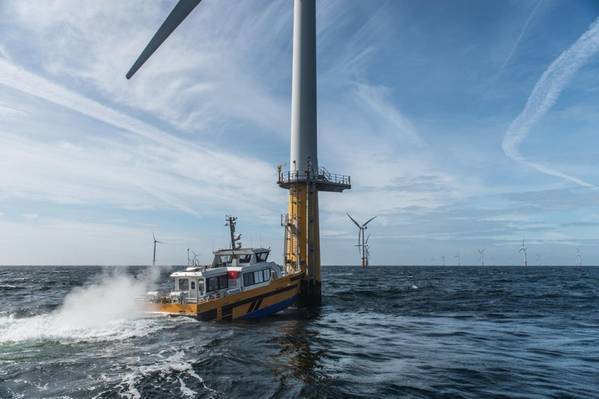
The UK-based Offshore Renewable Energy (ORE) Catapult has said it has secured funding for five projects as part of the Clean Maritime Demonstration Competition, funded by the Department for Transport and delivered in partnership with Innovate UK.
Fifty-five projects successfully secured £23m funding as part of the Competition, announced at an event during London International Shipping Week by Transport Secretary Grant Shapps.
ORE Catapult is either leading or is a consortium partner in five of those projects, totaling £3.3m in funding awarded.
"The projects will convene industry, the supply chain, and Government to address the policy, commercial, regulatory and technical barriers to achieving maritime decarbonization," ORE Catapult said.
One of the Competition's flagship projects is a feasibility study into establishing a National Clean Maritime Demonstration Hub in ABP's Grimsby docks – the world's largest offshore wind O&M Port. ORE Catapult will lead this project alongside nine supply chain partners and two industrial advisors.
The other four projects, as shared by ORE Catapult, are:
The decarbonization of the UK's maritime fleet is essential if we are to achieve Net Zero by 2050 and transitioning to a future of zero-emissions shipping with clean vessels and alternative fuels is vital. As both a potential producer and user of clean fuels, the UK's offshore wind industry is in a unique position to act as a springboard for that broader maritime decarbonization, ORE Catapult said.
Offshore wind has ambitious growth and decarbonization targets and engages the UK's maritime fleet and its Ports across all aspects of its lifecycle – from installation to decommissioning. The industry's workboat sector already includes 70% UK content, and there are opportunities for the sector to develop solutions that can further decarbonize our broader maritime supply chains, ORE Catapult added.
Regional Partnership Manager Stuart Barnes, who led on the Competition bids for ORE Catapult, said: "The fact that ORE Catapult is leading, or is a partner in, five out of the 55 projects funded through the Competition just underlines the huge role that offshore wind will play in the future decarbonization of the UK's maritime sector. These grant funding wins build on the work we undertook earlier this year in partnership with the Workboat Association on behalf of the Department for Transport and the Foreign, Commonwealth, and Development Office to develop an innovation roadmap for decarbonizing North Sea offshore wind operations and maintenance vessels.
“We are excited to be working on this diverse group of projects with some of the industry's leading players from across the UK. We must ensure that offshore wind plays a key role in forging the emerging clean maritime industry of the 21st Century, driving rapid innovation, improving sustainability and levelling up through the creation of high-value jobs in key maritime clusters across the UK."
Project descriptions
National Clean Maritime Demonstration Hub
The project will conduct a high-quality feasibility study that, informing a business case for infrastructure-investment in Zero-Emission (ZE) Fuels/charging-infrastructure at the Port of Grimsby, at the same time as an investment in operational programs of work that will establish Grimsby as a national Clean Maritime Demonstration Hub (CMDH).
Project partners include: ORE Catapult; Wood Group; Lloyds Register; ABP; Infrastrata (Harland & Wolff); TP Group; MJR Power & Automation; ZEM-Tech; Rix; Workboat Association
Artemis electric eFoiler CTV
Led by Artemis Technologies and building on the work of the emerging Belfast Maritime Consortium cluster as a global center of excellence for zero-emission maritime technology, this project brings together partners from across the whole supply chain to investigate the feasibility of the Artemis-eFoiler™ electric propulsion system as a transformative solution to decarbonize global CTV operations.
Project Partners include: Artemis Technologies; OREC; Lloyd's Register EMEA, Tidal Transit Ltd.
Offshore wind on-turbine electrical vessel charging system
This project will design, build, and test an electric charge point situated on a wind turbine. This approach will access the infrastructure already in place (turbine platform, electrical cables) to provide renewable electricity to vessels. As an eCTV 'docks' with the turbine, a cable reel will lower down an electrical charge connection which will plug into the vessel and charge a battery on-board. Although the technology necessary for this is relatively mature this has yet to be done before and so this project will need to develop standards, working practices, and procedures in order to safely carry this out at sea.
Project Partners include: ORE Catapult MJR Power & Automation Ltd; OREC; Artemis Technologies; Tidal Transit; Xceco.
Data Led Emissions Management (D-LEMA)
This project builds upon proven solutions to provide an innovative approach to the analysis of vessel emissions, a sector that, to date, has lacked a clear analytic methodology. It will utilize the ION Geo Marlin solution as a base, proven over more than 150 global deployments, to integrate data from an existing activity database. The resulting solution will provide historical backlogged performance analytics as a baseline, as well as close to real-time performance analytics via a range of standard dashboards that will enable the port and vessel operators to review performance.
Project Partners include: ORE Catapult; Plymouth Marine Laboratory
OWL Charging Vessel
This project will complete a detailed design and operational simulation of a mothership charging vessel, hosting a number of electric CTV’s. The mothership will take the concept of in-field charging and provide a flexible solution capable of removing diesel emissions from offshore wind Operations and Maintenance. This project represents genuine architectural and disruptive innovation, by mirroring the availability of onshore charging into a system capable of functioning effectively in an offshore market.
Project Partners include: Aluminium Marine Consulting; ORE Catapult; Turbulent Simulations Ltd; MJR Power & Automation Ltd; Jeremy Benn Associates Ltd



